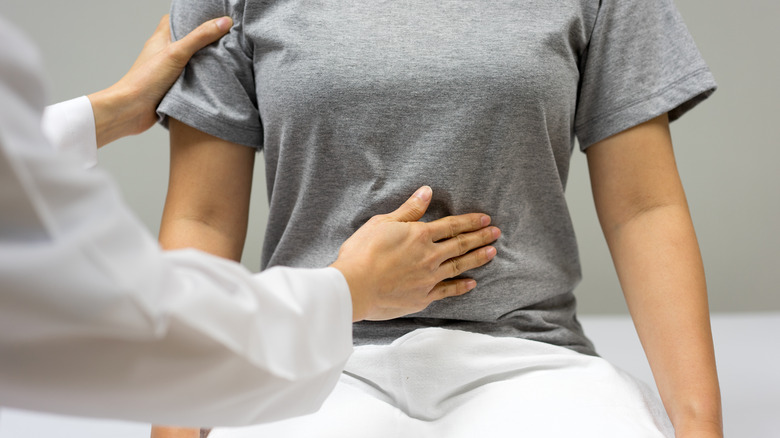What It Really Means When You Feel Like Your Stomach Is Burning
Most of us know the discomfort of a burning tummy. Some conditions leading to this troublesome symptom can occur at any time, regardless of age. According to WebMD, a burning sensation in the stomach can also be accompanied by a feeling of fullness, loss of appetite, bloating, and a dull, persistent ache in the upper abdominal region. While some instances of abdominal burning may be temporary, like after consuming oily or spicy foods, other instances can be ongoing. When this occurs, you may become concerned about a potential underlying health condition. But experts suggest it could be chalked up to a lifestyle factor.
Interestingly, there are several ways lifestyle can lead to abdominal discomfort, including psychological factors, diet, and substance use. Anxiety or constant worrying releases multiple hormones, particularly cortisol, which interferes with appetite, digestion, and bowel movements. Additionally, it causes an internal imbalance in the natural bacterial flora necessary for smooth food breakdown, according to UChicago Medicine.
Other lifestyle habits such as smoking and alcoholism can also trigger indigestion and stomach issues. Therefore, doctors advise against smoking and frequent drinking to prevent stomach aches. Additionally, Medical News Today recommends cutting down on spicy, sugary, salty, deep-fried foods, as they are packed with carbs and other stomach-harming agents.
But if lifestyle factors are ruled out, you may wish to consult your doctor to rule out underlying conditions.
When lifestyle factors are ruled out
If your burning stomach continues to be an issue, you may wish to explore whether or not you have an underlying condition. For instance, gastroesophageal reflux disease (GERD), also known as heartburn or acid reflux, is a painful esophageal disorder that causes digestive acid to flow back to the mouth and affects about 20% to 30% of Americans, per Medical News Today. Additionally, your doctor may test for an infection which is often accompanied by nausea, diarrhea, and stomach aches in the upper abdomen. H. pylori is a critical bacterial infection in the stomach that can cause a burning sensation along with other symptoms like gas, reports Medical News Today.
If an infection isn't a source of your tummy troubles, your doctor may need to test you for ulcers. According to Mayo Clinic, peptic ulcers produce painful sores in the intestines or stomach lining, leading to severe stomach pain. It may be accompanied by other symptoms including bloating, indigestion, or lack of appetite. More often than not, a doctor can help you get to the bottom of your stomach issues by recommending lifestyle modifications, medications, or procedures like upper endoscopies.


